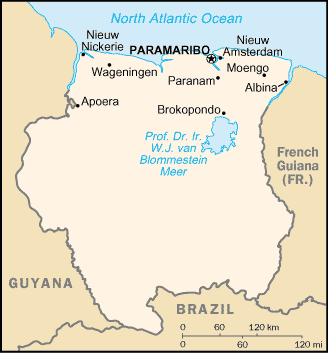Capital: Paramaribo
Population: 435,000 (UN, 2003)
Year of Independence: 1975, from the Netherlands
Type of Government: Constitutional Democracy
GNP: $1.5 billion (2000 est.)
Natural Resources: timber, hydropower, fish, kaolin, shrimp, bauxite, gold, and small amounts of nickel, copper, platinum, iron ore
Political Parties: Democratic Alternative ’91 or DA ’91 (a coalition of the Alternative Forum or AF and Party for Brotherhood and Unity in Politics or BEP, formed in January 1991); Democratic National Platform 2000 or DNP 2000 (coalition of two parties, Democratic Party and Democrats of the 21st Century); Independent Progressive Democratic Alternative (OPDA); Millennium Combination (MC) [a coalition of three parties, Democratic Alternative, Party for National Unity and Solidarity, and National Democratic Party]; National Democratic Party (NDP); Naya Kadam (NK); Party for Renewal and Democracy (BVD); Party of National Unity and Solidarity (KTPI); Pertjaja Luhur; Progressive Workers’ and Farm Laborers’ Union (PALU); The New Front (NF) [a coalition of four parties Suriname National Party or NPS, Progressive Reform Party or VHP, Suriname Labor Party or SPA, and Pertjaja Luhur]; The Progressive Development Alliance (a combination of three parties, Renewed Progressive Party or HPP, Party of the Federation of Land Workers or PVF, and Suriname Progressive People’s Party or PSV)
Suriname has a heritage of Indian Asian and mixed African and European people, with a large Indonesian minority. Ethnic separation exists socially and politically in Suriname, where groups rarely converge outside the marketplace. Suriname’s rain forests cover a large part of its land, making the cultivated coastal plains an important feature of the country’s topography, as agriculture and exports of food products comprise a significant portion of its economy. The majority (70 percent) of Suriname’s revenues comes from the mineral bauxite. This dependence makes it highly vulnerable to market fluctuations, and its lack of development in the tourist trade leaves it without an economic safety net. Suriname has experienced several military coups and endured a civil war since its independence in 1975. Civilian rule was finally restored in 1996 after several bouts with corruption and the jostling of several parties, including the National Democratic Party and the New Front for Democracy, the party of the current president, Ronald Venetiaan.



